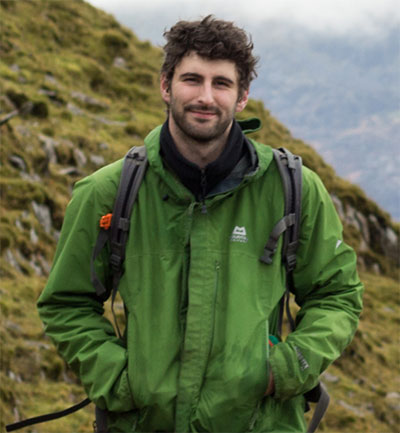Profile of David Fidler

- Name
- David Fidler
- Position
- PhD Student, BBSRC/NERC CDT (STARS)
- d.fidler@bangor.ac.uk
- Phone
- Location
- F7, Memorial building, School of Natural Sciences, Bangor University, Deiniol Road, Bangor, Gwynedd, LL57 2UW
About
I am currently undertaking a PhD studentship with the STARS CDT, under the supervision of James McDonald and Davey Jones. The PhD is focussed on the role that microbes play in the degradation of lignocellulose in soils, using metagenomics and high-throughput in situ cultivation techniques to achieve this.
Before starting my PhD, I undertook a BSc in ecology with a placement year, and an MRes in biological sciences, at Cardiff University.
CV
2017 – Present PhD, Bangor university
2016 – 2017 MRes in Biological Sciences (Distinction), Cardiff University
Supervisors: Rob Thomas and Bill Symondson
Thesis: Molecular identification of pied flycatcher (Ficedula hypoleuca) nestling diet, and effects on body condition
2011 – 2016 BSc in Ecology (2:1), Cardiff University, with Placement Year at Hawkesbury Institute for the Environment
Supervisors: Hefin Jones and Carsten Müller
Dissertation: Interactive effects of elevated CO2 and temperature on a tritrophic system
Placement year supervisor: Scott Johnson
Placement year project: Atmospheric change causes declines in woodland arthropods and impacts specific trophic groups hardest
Conferences and workshops
2019, Windermere, Soils Training And Research Studentships Conference (poster presentation)
2018, Swansea University, Molecular Microbial Ecology Group Meeting 2018 (oral presentation). Registration grant awarded by FEMS. Runner-up for IJSEM Microbial Diversity, Identification and Taxonomy Journal Prize
2015, British Ecological Society Annual Meeting (poster presentation)
Research
Lignocellulose is the most abundant biocomposite on Earth, making up 90% of plant material. Degradation of lignocellulose is the rate limiting step in the global carbon cycle, yet we have a poor understanding of how lignocellulose is degraded, due to the intractability of most microorganisms to culture. I will be attempting to address this knowledge gap using high-throughput in situ cultivation of soil microorganisms with subsequent mesocosm experiments, alongside genomic and metagenomic studies. Understanding the community function and dynamics of lignocellulose degraders in soil has biotechnological implications for production of biofuel, and will be critical for refining predictions of soil carbon fluxes, as dependent on soil microbial community.
Publications
Improving quantification of bivalve larvae in mixed plankton samples using qPCR: A case study on Mytilus edulis
Alexander, J., Malham, S., Smyth, D., Webb, J., Fidler, D., Bayford, P., McDonald, J. & Le Vay, L., 15 Feb 2021, In : Aquaculture. 532, 736003.
Shifts in Soil Structure, Biological, and Functional Diversity Under Long-Term Carbon Deprivation
George, P. B. L., Fidler, D. B., Van Nostrand, J. D., Atkinson, J. A., Mooney, S. J., Creer, S., Griffiths, R. I., McDonald, J. E., Robinson, D. A. & Jones, D. L., 14 Sep 2021, In : Frontiers in Microbiology. 12, 735022.
Facey, S.L., Fidler, D.B., Rowe, R.C., Bromfield, L.M., Nooten, S.S., Staley, J.T., Ellsworth, D.S. and Johnson, S.N., 2017. Atmospheric change causes declines in woodland arthropods and impacts specific trophic groups. Agricultural and Forest Entomology, 19(1), pp.101-112.
